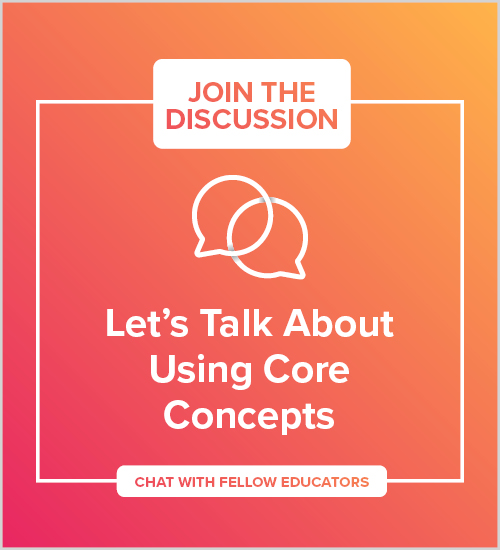Core Concepts of Physiology Learning Module
Authors
 Joel Michael, PhD
Joel Michael, PhD
Rush Medical College, Chicago
 Jenny McFarland, PhD
Jenny McFarland, PhD
Edmonds College, Lynnwood, Washington
Core concepts are big ideas that provide a framework for understanding a discipline and facilitate application of knowledge to learn new content. The core physiology concepts are a set of 14 topics, designed and heavily vetted by physiology educators, that are applicable across all physiological systems. The core physiology concepts can be used, in full or in part, to organize physiology content at any level. At the completion of this interactive learning module, participants should be able to:
- define a “big idea” or core concept;
- identify physiology core concepts that are particularly important for students to understand;
- identify physiology core concepts that participants intend to use in a specific course and explain the factors that influence this decision;
- map applicable core concepts that will facilitate student understanding across specific physiology topics;
- for a particular physiology topic, identify core concepts that will be assessed;
- describe the structure of physiology conceptual frameworks;
- align a specific sub-idea from a conceptual framework with a learning objective for their course;
- write an assessment question that is aligned with a sub-idea and an aligned learning objective; and
- describe the benefits of using a conceptual framework in courses.


Core Physiology Concept Lessons
- Cell Signaling—Learn how cells conduct trillions of players using chemical messengers, electrical pulses, and intimate handshakes. Grasp the three major pathways and five governing principles of cell signaling.
- Transport Across Membranes—Dive into mechanisms regulating movement across the plasma membrane and learn how cells control their internal environment by managing transport.
- Cell Membranes—Get close-up with the master architects of cellular life: cell membranes. Learn how their lipids, proteins, and domains craft a dynamic interface, enabling communication, transport, and the delicate equilibrium of homeostasis.
Resources to Explore
Define the Core Concepts of Physiology and Determine Which Are Appropriate for Your Course
Find the definitions of the core physiology concepts, understand how they were developed and consider which may be best used in a course.
The Core Concepts of Physiology: A New Paradigm for Teaching Physiology
Michael J.A.,
et al., 2017
Reflections on Core Concepts for Undergraduate Physiology Programs
McFarland J.L., Michael J.A., Advances in Physiology Education,
2020
The Core Principles ("Big Ideas") of Physiology: Results of Faculty Surveys
Michael J.A., McFarland J.L., Advances in Physiology Education,
2011
The "Core Principles" of Physiology: What Should Students Understand?
Michael J.A., et al., Advances in Physiology Education,
2009
Another Look at the Core Concepts of Physiology: Revisions and Resources
Michael J.A., McFarland J.L., Advances in Physiology Education,
2020
Evaluation of Core Concepts of Physiology in Undergraduate Curricula: Results from Faculty and Student Surveys
Stanescu C.I.,
et al., Advances in Physiology Education, 2020
Use of Core Concepts of Physiology Can Facilitate Student Transfer of Learning
Michael J.A., Advances in Physiology Education,
2022
Introduction to Homeostasis
Hannah R., Animal Physiology, 2022
The Definitions and Explanations of the 14 Core Concepts of PhysiologyAdapted from Michael J.A., McFarland J.L., Advances in Physiology Education, 2020
What Do We Mean When We Talk About “Structure/Function” Relationships?
Michael J.A., Advances in Physiology Education,
2021
A Physiologist's View of Homeostasis
Modell H., et al., Advances in Physiology Education, 2015
Core Concepts in Physiology: Teaching Homeostasis through Pattern Recognition
Chirillo M., et al., Advances in Physiology Education,
2021
Using Dramatizations to Teach Cell Signaling Enhances Learning and Improves Students’ Confidence in the Concept
Halpin
P.A., Gopalan C., Advances in Physiology Education, 2021
Spiders in Motion: Demonstrating Adaptation, Structure-function Relationships, and Trade-offs in Invertebrates
Bowlin M.S., et
al., Advances in Physiology Education, 2014
Which Way do the Ions Go? A Graph-drawing Exercise for Understanding Electrochemical Gradients
Crowther G.J., Advances in Physiology Education,
2017
Physiology Core Concepts in the Classroom: Reflections from Faculty
Crosswhite P.L., Anderson L.C., Advances in Physiology Education,
2020
The 2019 P-MIG Student Survey Report and Capturing the Undergraduate Perspective of Physiology Programming
Rogers J., et al.,
Advances in Physiology Education, 2020
Best Practices in Active and Student-centered Learning in Physiology Classes
Goodman B.E., et al., Advances in Physiology Education,
2018
Navigating the “COVID Hangover” in Physiology Courses
Schaefer J.E., Advances in Physiology Education, 2022
Understand Physiology Conceptual Frameworks and How You Can Use Them to Shape Your Course
Learn more about how the large ideas of core concepts are “unpacked” into hierarchical conceptual frameworks that provide detailed descriptions of the content categorized within a core concept.
The Core Concepts of Physiology: A New Paradigm for Teaching Physiology
Michael J.A.,
et al., 2017
Reflections on Core Concepts for Undergraduate Physiology Programs
McFarland J.L., Michael J.A., Advances in Physiology Education,
2020
The "Core Principles" of Physiology: What Should Students Understand?
Michael J.A., et al., Advances in Physiology Education,
2009
Another Look at the Core Concepts of Physiology: Revisions and Resources
Michael J.A., McFarland J.L., Advances in Physiology Education,
2020
Collected Conceptual Frameworks
Michael J.A., 2022
A Conceptual Framework for Homeostasis: Development and Validation
McFarland J.L., et al., Advances in Physiology Education,
2016
Validating a Conceptual Framework for the Core Concept of “Cell-Cell Communication”
Michael J.A., et al., Advances in Physiology Education,
2017
A Conceptual Framework for the Core Concept of “Cell Membrane”
Michael J.A., Modell H., Advances in Physiology Education,
2019
Validating The Core Concept of “Mass Balance”
Michael J.A., Modell H., Advances in Physiology Education, 2021
Development of Concept-based Physiology Lessons for Biomedical Engineering Undergraduate Students
Nelson R.K., et al., Advances in Physiology Education,
2013
Best Practices in Active and Student-centered Learning in Physiology Classes
Goodman B.E., et al., Advances in Physiology Education,
2018
Navigating the “COVID Hangover” in Physiology Courses
Schaefer J.E., Advances in Physiology Education, 2022
Assess Student Learning of the Core Physiological Concepts
Determine how and if students are learning the physiology content associated with the core physiology concepts.
Conceptual Assessment in the Biological Sciences: a National Science Foundation-Sponsored Workshop
Michael, J.A., Advances in Physiology Education,
2007
The Second Conceptual Assessment in the Biological Sciences Workshop
Michael J.A., et al., Advances in Physiology Education,
2008
The Core Principles ("Big Ideas") of Physiology: Results of Faculty Surveys
Michael J.A., McFarland J.L., Advances in Physiology Education,
2011
The "Core Principles" of Physiology: What Should Students Understand?
Michael J.A., et al., Advances in Physiology Education,
2009
Another Look at the Core Concepts of Physiology: Revisions and Resources
Michael J.A., McFarland J.L., Advances in Physiology Education,
2020
Putting the Guidelines to Work: Moving from Undergraduate Physiology Curricular Guidelines to Program Development and Improvement
Johnson K.M.S., Advances in Physiology Education, 2020
Development and Validation of the Homeostasis Concept Inventory
McFarland J.L., et al., CBE-Life Sciences Education, 2017
Question Order and Student Understanding of Structure and Function
Carter K.P., Prevost L.B., Advances in Physiology Education,
2018
Phys-MAPS: A Programmatic Physiology Assessment for Introductory and Advanced Undergraduates
Semsar K., et al., Advances in Physiology Education,
2018
A New Assessment to Monitor Student Performance in Introductory Neurophysiology: Electrochemical Gradients Assessment Device
Cerchiara
J.A., et al., Advances in Physiology Education, 2019
A New Model for Organizing Curriculum Alignment Initiatives
Shaltry C., Advances in Physiology Education, 2020
Incorporating Higher Order Thinking and Deep Learning in a Large, Lecture-based Human Physiology Course: Can We Do It?
Hobbins
J.O., et al., Advances in Physiology Education, 2020
Explore the Center
Themes and Resources
- Evidence-based Teaching Practices
- Inclusive Teaching
- Teaching and Learning Integrative Physiology
- Physiology Education Research
- Curriculum Development
Community Events
Share your event ideas
More from the Center
- Center Home
- About the Center
- Support the Center
- Meet the Advisory Board
- Interactive Content from Center Partners
- Signup for Announcements
- Advances in Physiology Education
- Be a Champion for the Center
- Solutions for Educators
Volunteer
#CenterForPhysiologyEd




